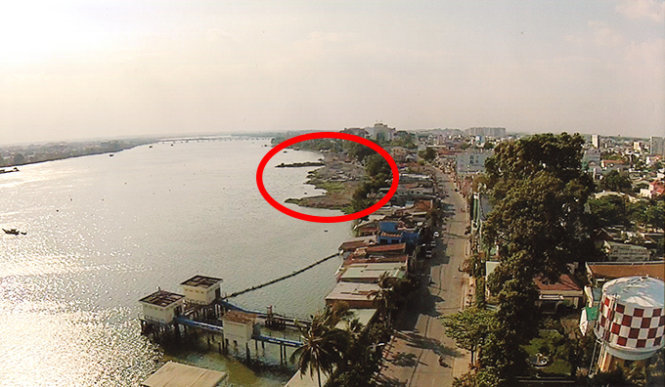A large project, now suspended, to build a residential area by encroaching on the Dong Nai River flowing through the southern namesake province has met with criticism by many experts
>> An audio version of the story is available here Local experts have expressed trenchant criticism of a multimillion-dollar project to build a residential area by reclaiming land from Vietnam’s longest river regarding its potential adverse impact on the environment, even though the developer has suspended it. The development of the Pegasus Residence project in the southern province of Dong Nai was approved by the local People’s Committee in May 2014. Toan Thinh Phat Investment Architecture and Construction Joint Stock Company is the developer of the project, estimated to cost VND3.2 trillion (US$148.5 million). The 8.4ha project is intended to develop a residential area along one bank of the Dong Nai River by reclaiming land from it. The river is 586km in length – considered the longest in Vietnam – and flows through Lam Dong and Dak Nong Provinces in the Central Highlands, and Binh Phuoc Province, Dong Nai Province, Binh Duong Province, and Ho Chi Minh City in the southern region. After the project was kicked off, Pegasus Residence faced serious objections from many experts who warned about the potential impacts it would have on the ecological environment and life of local residents. Given such opposition, on March 27 Toan Thinh Phat asked the provincial People’s Committee for the suspension of the project.Objections One of the experts who opposed the project is Dr. Vu Ngoc Long, head of the Southern Ecological Institute, who told Tuoi Tre (Youth) newspaper that it was inadvisable to fill up part of that major river with rock and soil to build a residential area. He made the comment after making a three-day surveillance tour, from March 27 to 29, of the location where the project was implemented. Of the total area expected to be created under the project, about 77,217m² would come from reclaiming land from the river, Dr. Long said. The reclaimed land would require a huge amount of rock and soil to be poured into the river, he said. Such reclamation would cause a major change to the river’s current, affect the structure of its bed, and have negative impacts on residential areas nearby, the academic said. Residents in both Dong Nai and neighboring localities will suffer if the developer is allowed to continue implementing the project, Dr. Long said. Dr. Dao Trong Tu, from the Vietnam Rivers Network, also told Tuoi Tre that this project should not be carried out via river encroachment. All projects related to rivers must comply with applicable laws, including the Law on Water Resources, Law on Dykes, and Law on Disaster Prevention and Control, he said. Under such legislations, no residential areas are allowed to be built on rivers, Dr. Tu added. The Vietnam Rivers Network has also proposed that the Dong Nai authorities do not let Toan Thinh Phat reclaim land from the river. Associate Professor Le Anh Tuan, deputy head of the Climate Change Research Institute under Can Tho University in the Mekong Delta, also said there have been some lessons from other countries, where changes to river currents had had impacts on local residents. Associate Professor Tuan pointed out that Thailand once encroached on the Chao Phraya River, which runs toward Bangkok from the northeast region, to construct multi-story buildings, restaurants, and hotels. The builders thought they could control Chao Phraya and made light of the influences of such construction activities on the river. In 2011, a heavy rain forced two hydropower dams upstream to discharge water, thus causing Bangkok to suffer a terrible flood with damage totaling $6 billion, Dr. Tuan said. On March 30, the website of the Government Office reported that Deputy Prime Minister Hoang Trung Hai has assigned the Ministry of Natural Resources and Environment to coordinate with other relevant ministries and the Dong Nai People’s Committee to review the project, thoroughly assess its impacts, and deal with related issues in accordance with existing laws. A report on all this must be submitted to the prime minister by May, Deputy PM Hai said.
Like us on Facebook or follow us on Twitter to get the latest news about Vietnam!























































